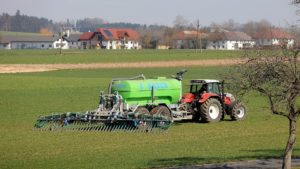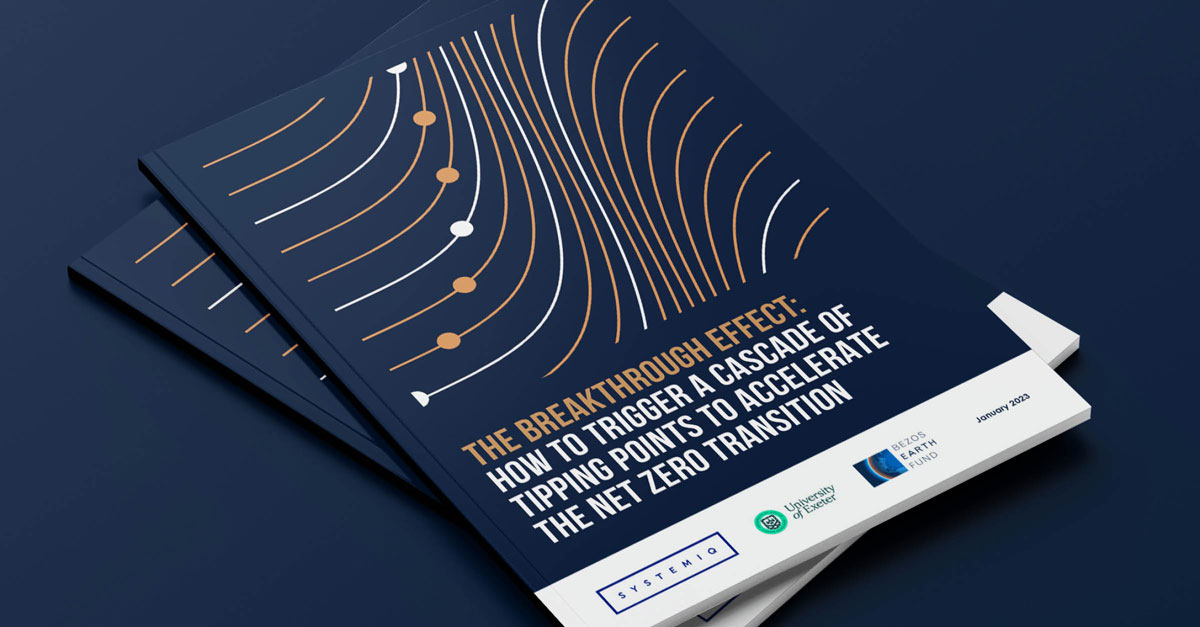The Breakthrough Effect: How to trigger a cascade of tipping points to accelerate the net zero transition launched today at the World Economic Forum in Davos. It is the most comprehensive report to date on ‘positive socioeconomic tipping points’. The report is produced by an international team including Systemiq and the Global Systems Institute (GSI), University of Exeter, and is a contribution to Systems Change Lab convened by the Bezos Earth Fund and World Resources Institute.
The report supports the Breakthrough Agenda, the First Movers Coalition and other initiatives working to make low-carbon solutions the most affordable, accessible and attractive option in each emitting sector. It highlights three “super-leverage points” that could trigger a cascade of decarbonisation across sectors covering 70% of global greenhouse gas emissions. With time running out to limit global warming to 1.5°C, the report shows how parts of the global economy could move rapidly towards zero emissions through targeted interventions to produce tipping points that not only cut emissions in one key sector, but support faster changes in other parts of the economy.
“Our report spotlights key opportunities to effect change that can produce huge returns in terms of decarbonisation. It identifies positive tipping points in the highest-emitting sectors of the global economy, and analyses the conditions required to trigger them.”
(Mark Meldrum, Systemiq partner and a lead author)
The three super-leverage points are: mandates for the sale of battery electric vehicles (BEV), mandates requiring “green ammonia” to be used in the manufacturing of agricultural fertilisers, and public procurement of plant-based proteins.

1: Sale of BEVs: Tipping point likely when BEVs hit sticker price parity with internal combustion engine vehicles. Greater deployment drives scale economies in battery production, further increasing cost advantage. Charging infrastructure roll out is key to overcome range anxiety.
 2: Fertiliser: “Green ammonia”: Tipping point possible after 1st wave of green ammonia plants for fertilisers developed (~50 plants, ~45–50 Mt productionp.a.) to kick-off large-scale adoption – 2nd wave to benefit from de-risked investment. This can close the initial cost premium for green ammonia vs. grey ammonia through scale economies in H2 production.
2: Fertiliser: “Green ammonia”: Tipping point possible after 1st wave of green ammonia plants for fertilisers developed (~50 plants, ~45–50 Mt productionp.a.) to kick-off large-scale adoption – 2nd wave to benefit from de-risked investment. This can close the initial cost premium for green ammonia vs. grey ammonia through scale economies in H2 production.

3: Alternative Proteins: A tipping point may be triggered once plant-based alternatives reach cost parity with animal protein and equivalent attractiveness (taste, texture, nutrition). This will be influenced by a number of factors particularly social and cultural norms.
This report is part of a Bezos Earth Fund partnership supported by a £1 million grant. The University of Exeter team are now leading a community of researchers working on a full “State of Tipping Points” report looking at both positive socioeconomic tipping points and negative climate tipping points in time for COP28 in November.
“We need to find and trigger positive socioeconomic tipping points if we are to limit the risk from damaging climate tipping points”
(Professor Tim Lenton, lead author and GSI Director)
To receive information on news and events related to the Tipping point Alliance please email tippingpoints@exeter.ac.uk and put ‘Subscribe’ in the email title.

